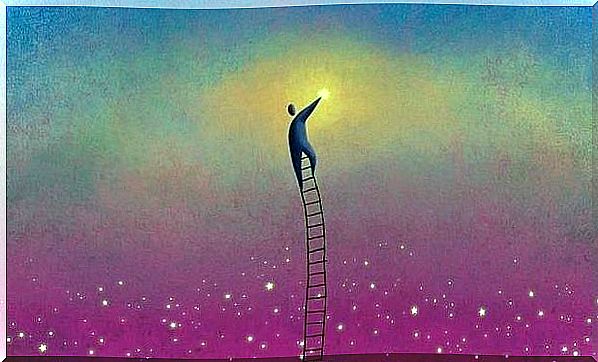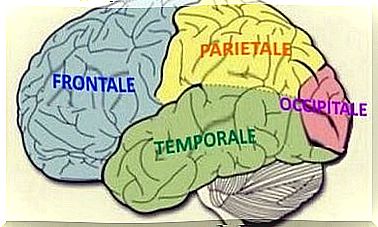When You Hit The Bottom You Can Only Go Up

Sometimes it seems that life plunges headlong into an abyss from which there seems to be no escape. We touch the bottom on the emotional, physical, social and working level, and we find ourselves there, huddled in fear and sadness, feelings that are now more and more present and that seem the preamble to the appearance of various mood disorders.
In life we have all faced serious events, experienced dramas or even tragedies, but the severity of each of them depends on the way we deal with them, rather than the event itself. We’ve all been strong, we’ve all had a plan in mind before experiencing pain – that’s when the plans vanished. In reality, they just had to be redone. When you hit rock bottom it is normal to feel lost.
According to Beck’s explanation of depression, the concept of the Descending Arrow and that of Paradoxical Intention are used to question some irrational thoughts. By taking these techniques as a point of reference and applying them to your personal experience, you will realize that after hitting the bottom you can only go back.
“True pain, the one that makes us suffer deeply, sometimes makes even the most carefree man really serious and firm, albeit for a short time. And even the poor in spirit become smarter after real pain ”.
– Fyodor Dostoevsky –
When the mistake is fear
It is normal to be afraid that adverse events will occur, but after experiencing severe pain and hitting rock bottom, it turns out that there are two options: to remain in an almost vegetative and painful state or to go back up. The decision is yours.

The Descending Arrow is a cognitive therapy technique that consists of selecting a negative thought and answering the question: if this thought were real, what would it lead me to ? The answer will generate a new negative thought. Below, other questions should be answered (by drawing descending arrows), which will highlight counterproductive beliefs (perfectionism, the need for approval, fears, etc.)
When you are overwhelmed by a painful thought and you believe you have hit rock bottom, when you are convinced that there is no escape and you find yourself having to explain what this means for you, it is normal to be subjugated by new negative thoughts. Example: you are faced with a man who has lost a child and who is assailed by the thought of not being able to take care of the other children, ask him “What would another child’s illness mean for you?”
Surely he will see a new feeling of pain emerge and more, up to a catastrophic vision of his life. In that moment, regardless of the hardness of the exercise and the events experienced, the person in question will realize that he can bear it and continue to live. His imagination amplified his pain making him stronger than he is.
At this point, the person will probably realize that, despite having been the victim of a devastating event, others could happen because nothing is safe in this life. It could be the dynamic of defeatist thoughts created by her own mind that favors them: because of her she could lose her job, drive the rest of her children away… In other words, lose everything that is important to her.
At that moment the person will be aware that he is on the level of despair, but he will not want to go even lower. He can only go up, and it will be easier than he thought. In fact, the only thing left to lose is fear.
We magnify the pains and reveal the absurdity in which we live
Paradoxical intention is a technique whereby the patient is taught to exaggerate negative thoughts rather than stop or counter them. Paradoxically, such thoughts come to assume absurd and meaningless characteristics. Evidently this technique will have to be associated with negative thoughts related to events of relative gravity – it would not be plausible to face thoughts about the fear of the future after the loss of a child.
Thanks to the paradoxical intention technique, the patient is made aware that his situation is not part of the worst possible scenario. In other words, if he feels lonely because he has been left, he will discover that he is far from the state of loneliness of those who cannot even count on the support of friends or family.
We bring our pain to the terror of tragicomedy and laugh at the absurdity of our catastrophism.
Suffering makes us wise, resilience makes us strong
Nothing in the world can bring us down if we don’t allow it. We are the ones who set the limits and times and have to defend ourselves from the harmful comments of those who judge without ever having experienced such a situation. To each his own”.
There are people who go through dark times and come out frustrated, causing frustration even in those around them. Others, on the other hand, turn their frustration into the exact opposite: they know what they’ve been through and don’t wish it on anyone. They are luminous people, reborn from the gray of their existence.

When we go beyond the limit of ridicule, pain, humiliation, being judged, wretched … when we overcome all this and we realize that we have suffered enough, then we glimpse the true meaning of our existence. Because only after hitting the bottom and understanding the procedure, do we realize that the only solution left is to go back up.
We are faced with the certainty that it will no longer be the ego that will give us the push, but the desire to achieve authentic personal well-being; we will stop competing with anyone else to focus only on our dreams. After all the evil experienced, it is inevitable that something good awaits us around the corner. Hurry up then, get out of the lament, throw yourself headlong into life and just let yourself live. You have descended so low that now you can only go up.









